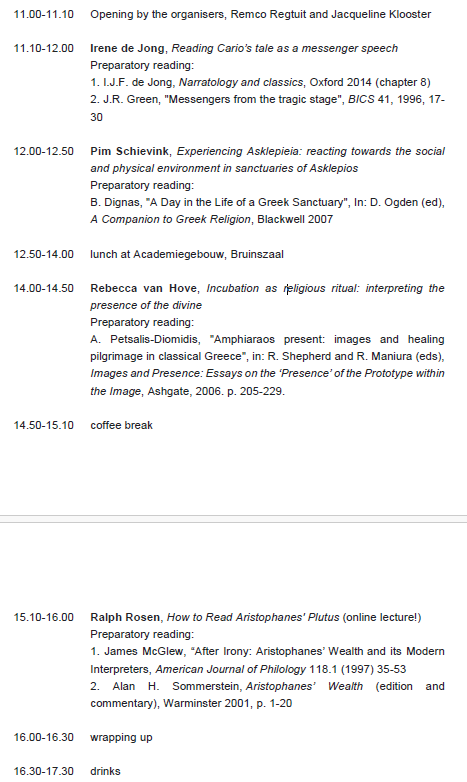Just before the Christmas break, the Dutch National Research School for Classical Studies, in collaboration with the Classics faculty of the University of Groningen, orchestrated a day exclusively dedicated to Aristophanes’ “Wealth,” with a specific focus on scenes related to the sanctuary of Asklepios. This Text-in-Context day provided Research Master students and PhD candidates from various Dutch universities with a program featuring four insightful presentations by Classicists and Ancient Historians The objective was to contextualize the central text, as outlined in the attached program. The diverse perspectives offered by the speakers truly complemented each other, resulting in a day of fruitful discussions on this captivating text

The passage in question (Wealth 627-740) unfolds as a narrative by a slave named Kario, who escorts the god Wealth to a sanctuary of Asklepios to cure the eyesight of Wealth. Kario delves into the rituals performed, the individuals present at the Asklepieion and what took place inside this sanctuary where multiple people sought a cure.
The day commenced with a presentation by Prof. Irene de Jong from the University of Amsterdam, who explored the trope of the messenger speech delivered by Kario. In the context of ancient theatre, messenger speeches, typically by minor characters, relay crucial off-stage events. Kario, however, plays a significant role and instead of being able to provide the narrative in one go is frequently interrupted, a feature that, according to de Jong, fosters a more authentic conversation, akin to real-life “backchanneling” dynamics.
Following this, I presented on the social and physical environment of Asklepieia. The focus was on providing participants with a nuanced understanding of the social groups interacting with each other within Asklepieia and the impact of physical surroundings on visitor experiences. Dedications, rather than architectural elements, were emphasized. Drawing on Wealth, temple inventories of the Athenian Athenian Asklepieion, votive reliefs, Herodas’ Fourth mime, and healing tales inscribed in the sanctuary of Epidauros, I highlighted that whilst the cures occur in an individual way (in the dreams of the worshipper) the communal aspect is equally important. Interaction with others in Asklepieia impacts the experiences and even individual cures were made visible for later generations through dedications that also reveal that there was room for expressing individual experiences. Lastly, the presentation underscored the object-agency of dedications in shaping the experiences of later sanctuary visitors. This built on major studies on Asklepios and served the goal of contributing to a historical contextualization of the text.
Dr. Rebecca van Hove of the University of Groningen continued with another paper focussed on the historical context of the text. She delved into the ritual procedures of incubation outlined in “Wealth,” exploring divine presence and drawing connections to the Amphiaraion of Oropos, another sanctuary where incubation occurred.

The last speaker was Prof. Ralph Rosen, joining us online from the University of Pennsylvania, who focussed on a question that contextualised essentially the whole day: how to read Aristophanes’ Ploutos? The text deals with broader questions on the distribution of wealth in Athens, probing whether the play serves primarily as societal commentary or perhaps we overemphasise these themes and thereby loose the main idea of comedy that the play first and foremost serves to make people laugh?
The day concluded with informal discussions over drinks, providing an opportunity to further delve into the day’s main themes. I was happy to participate as a speaker and the day was a valuable experience. Most importantly, I gained new insights from the other presentations that will help me during my own PhD trajectory, especially when researching Asklepios in Athens.

Leave a Reply